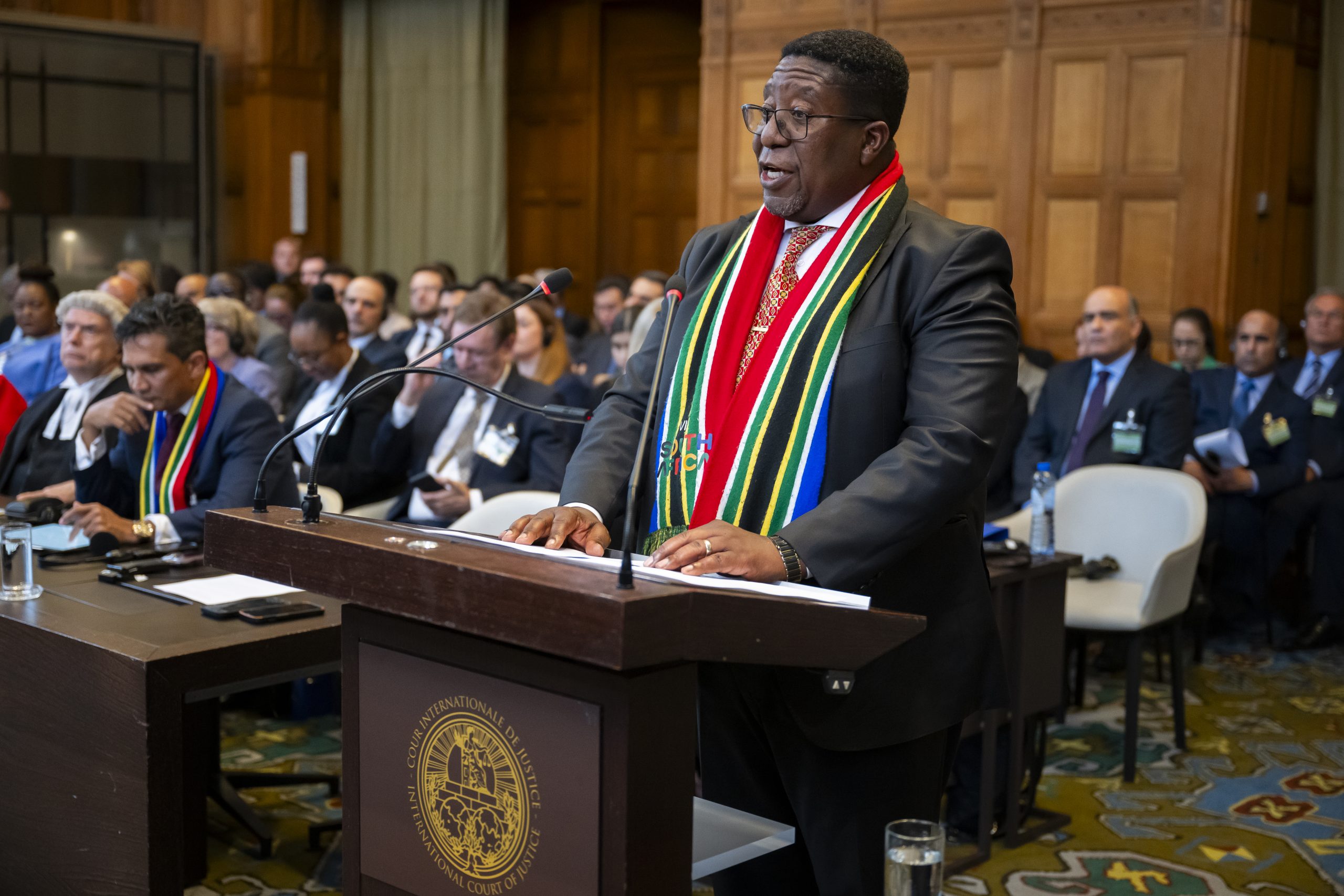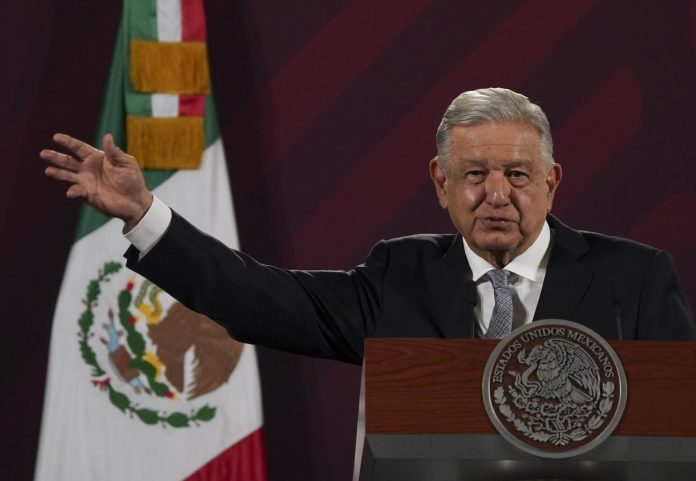Mexico has become the latest of several different nations to declare their intervention in South Africa’s case in the International Court of Justice (ICJ) against Israel, which accuses Israel of committing genocide. Mexico’s official application to intervene states it is intervening “in order to provide its view on the potential construction of the content of the provisions of the Convention relevant to this case.”
PRESS RELEASE: Mexico, invoking Article 63 of the #ICJ Statute, filed a declaration of intervention in the case concerning Application of the Convention on the Prevention and Punishment of the Crime of Genocide in the Gaza Strip (#SouthAfrica v. #Israel) https://t.co/kruJovhrXx pic.twitter.com/tSHs81sCfB
— CIJ_ICJ (@CIJ_ICJ) May 28, 2024
Mexico’s Application
Mexico’s application for intervention, which is 20 pages, states that the provisions outlined in the Convention on the Prevention and Punishment of the Crime of Genocide, or the genocide convention, carry obligations for all states, and further are considered to be peremptory norms under international law. Due to this, Mexico states that the ruling the court eventually makes on this case is of interest to all nations.
One of the most notable portions of Mexico’s application is their statement that “the mens rea (meaning ‘guilty mind’, in reference to criminal intent) of genocide can be derived from the general context surrounding the claimed conduct, that impeding access to humanitarian assistance may contribute to the destruction of a protected group.”
The deliberate restriction and barring of humanitarian aid is one of the largest, and most consistent, accusations levelled against Israel in the present conflict. South Africa in their arguments in the ICJ has accused Israel of using hunger as a weapon, due to the state of siege imposed upon Gaza that has seen the entirety of the population enter into a hunger crisis.
Israel has continually denied this accusation, and further has claimed to have expanded aid entry into Gaza over the course of the war. They have also at times blamed the UN for what Israel says is the UN’s failure to effectively distribute aid.
The remainder of the application establishes Mexico’s legal basis for intervention, outlines the sections of the genocide convention that are being called into question, as well as several minor aspects.
Notably missing from Mexico’s application, which separates it from South Africa’s initial case filing and other previous applications similar to Mexico’s, is a direct accusation towards Israel of genocide. While the application makes allusions to it, it never directly states it. This is a small but notable distinction in the application.

It is unclear the extent to which Mexico intends to intervene in the case, or when any such intervention may take place.
Mexico’s full application may be read here.
One of Many
As mentioned, Mexico’s intervention is the latest in a series of similar actions taken by several nations to intervene in the historic case.
Colombia filed their application in April, and Libya filed their official application earlier this month in order to intervene in the case. Nicaragua filed a similar application in January, invoking a different article, in order to intervene “as a party” in the case. Beyond these three nations, however, a number of different countries have announced their intention to file such an application, including Turkey, Egypt, Ireland, Germany, and more.
Egypt’s intent to intervene is particularly notable due to their unique relationship with both Israel and Gaza, as well as their continual involvement in humanitarian efforts due to the border they share with Gaza.
Germany’s is also particularly notable due to the fact that, contrary to the intervention’s of Libya, Colombia, and the the other nations that have applied, Germany is intervening on the side of Israel.
Germany has been one of Israel’s largest supporters throughout the present conflict.
The Case
The case which Mexico has applied to join was initially filed by South Africa at the end of December. The case accuses Israel of committing genocide within Gaza, and sought several provisional measures to be brought against Israel.
Initially, South Africa was seeking a court order for Israel to halt the war completely, take action to prevent genocide, and allow in humanitarian aid, among other things.
Later in January the court ruled on the provisional measures, and while they did not order Israel to halt their war, they did order them to take action to prevent genocide and allow in humanitarian aid. Furthermore, the court ruled that there was the “plausibility” of genocide.
Notably, the ruling of the plausibility of genocide is not an affirmation nor a denial of South Africa’s accusations, but largely served as a means of continuing the case based upon this plausibility. Thus far in the case, the court has only ruled upon provisional measures sought by South Africa. The wider case on the accusation of violations of the genocide convention could take years. Also notable is the fact that this plausibility served for Nicaragua’s own case against Germany, in which they accuse Germany of being complicit in Israel’s alleged genocide due to German political and material support for Israel, as well as the German cessation of funding for the UNRWA.
In late March the ICJ once again ruled on provisional measures, ordering Israel to expand humanitarian aid in Gaza. This order came as famine conditions were being reported within several areas in Gaza, primarily the north.
More recently, South Africa sought more provisional measures against Israel, with the beginning of Israel’s offensive on the city of Rafah, in the southern Gaza Strip. South Africa filed their request asking the court to bar Israel’s offensive on Rafah, as well as order Israel to allow unimpeded access of the UN, journalists, investigators, humanitarian organizations, and more into Gaza.

This request was filed May 10th, the same day Libya filed their intervention application.
A week later during hearings on the measures requested, South Africa altered their provisional measures, instead requesting that the court order Israel to halt the war altogether.
The court delivered their ruling on Friday, May 24th. While they did not order Israel to halt the war altogether, they did order Israel to halt their offensive upon Rafah, as was initially requested by South Africa.
Israel has maintained its offensive upon Rafah, in essence ignoring the order. Prime Minister Benjamin Netanyahu has, on several occasions, stated that no international decision will stop Israel.
Notably, the recent strike on Rafah which, according to the Gaza Health Ministry, killed at least 45 people, took place after this order.
The UN’s top court, rulings delivered by the ICJ are technically binding for any member state of the UN. However, the ICJ itself has no means of enforcing its rulings, leading to a number of them having been ignored by several different countries in the past.
Technically speaking, blatant violations or ignorance of an ICJ order would open that nation to potential sanctions by the UN, however such sanctions against Israel are highly unlikely to occur, particularly with the US’ veto powers in the UN Security Council.
Even still, individual nations may choose to undertake such measures.

